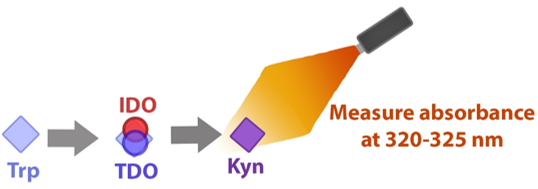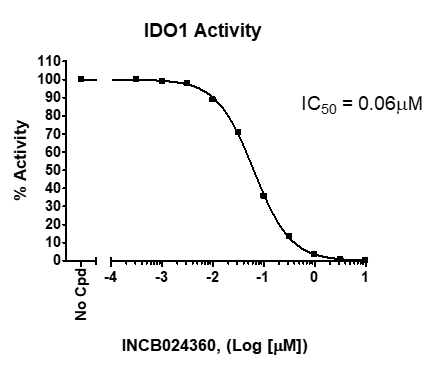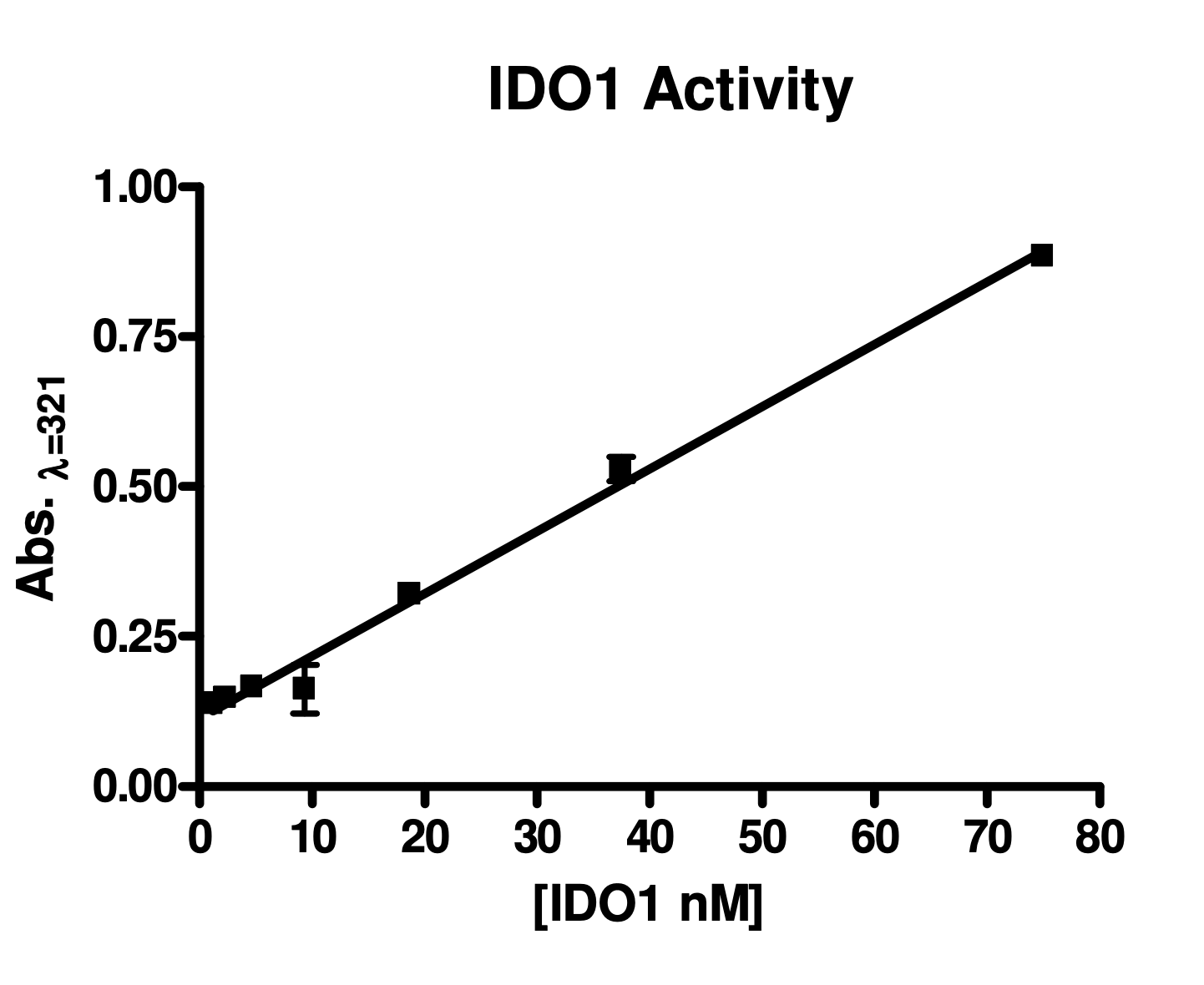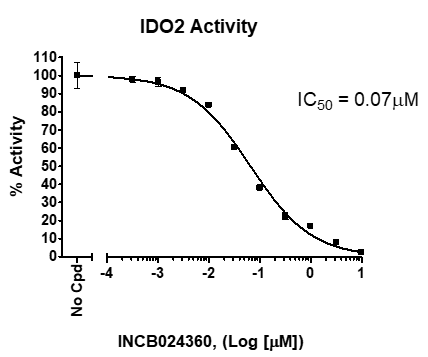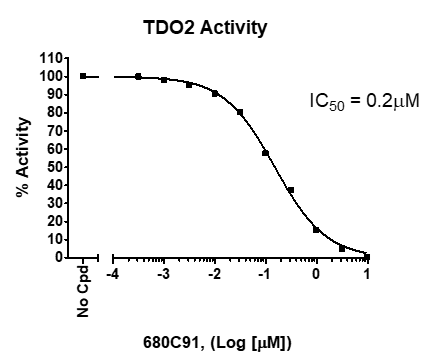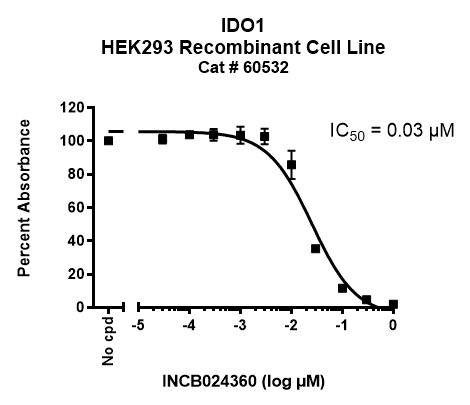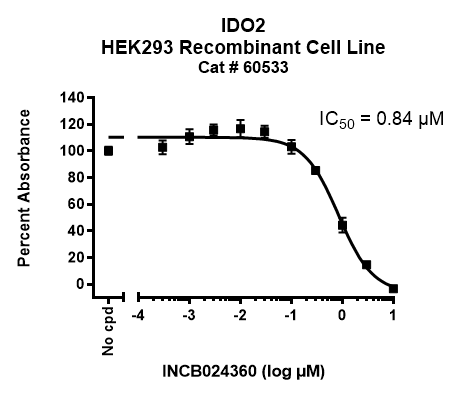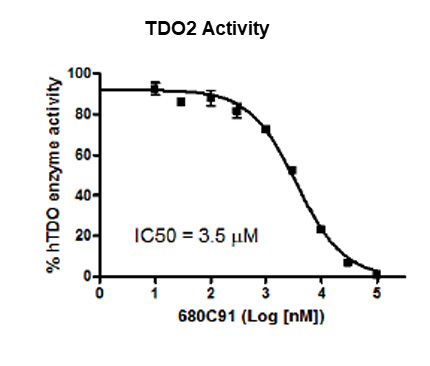IDO/TDO Screening Services
BPS offers biochemical and cell-based IDO/TDO screening services which can effectively accelerate your research and drug discovery programs. With all screening and profiling services, we provide a comprehensive (>10 page) report with both raw and analyzed data, graphs, detailed protocols, etc. Trust us to provide you with high quality data with fast turnaround time. Our team of experts along with our broad services portfolio makes it easy to:
- Screen for inhibitors/targets using our IDO or TDO assays
- Select from 10-point dose response IC50 determination or single point concentrations to determine % inhibition
- Receive data in a timely manner after compound submission
- Perform follow-up studies using the same enzymes manufactured in-house
- Get questions answered and project guidance in a timely manner
Contact BPS today to find out more about how we can assist you in your IDO1 related research.
Biochemical Assay Format:
Our IDO/TDO inhibitor screening assays are UV absorbance based, and it measures the ability of IDO/TDO enzymes to oxidize L-Trp substrate into N-formyl-kynurenine (NFK) as shown in the image above. To determine enzymatic activity, the absorption signal is measured @ 321 nM with increasing concentrations of enzyme. NFK exhibits a unique absorbance peak @ 321 nM, and as the concentration of enzyme increases, more L-Trp is converted to NFK giving an increase in absorbance signal as shown in the activity data below.
IDO1 Cell-Based Assay Format: The IDO1 Cell-Based Screening service is designed to measure IDO1 enzyme inhibition. Stable, recombinant HEK293 cells expressing tetracycline-inducible human IDO1 are treated with test inhibitors and IDO1 activity is detected by measuring Kyn levels in the cell culture medium.
IDO2 Cell-Based Assay Format: The IDO2 Cell-Based Screening service is designed to monitor IDO2 pathway activity and screen for inhibitors. Stable, recombinant HEK293 cells expressing tetracycline-inducible human IDO2 are treated with test inhibitors and IDO2 activity is detected by measuring Kyn levels in the cell culture medium.
TDO Cell-Based Assay Format: The TDO Cell-Based Screening service is designed to measure TDO enzyme inhibition. Stable, recombinant HEK293 cells overexpressing TDO are treated with test compound and TDO activity is detected by measuring Kyn levels in the cell culture medium.
For additional screening services to study the Kynurenine pathway, we also offer TPH1, TPH2, KMO and KYNU biochemical assays.
Background:
Tryptophan (Trp or L-Trp) is an important and essential amino acid that has a variety of functions within the cell. In addition to being incorporated into the polypeptide chain of proteins, various catabolic pathways can produce a number of functional Trp derivatives. In the context of a tumor, Trp catabolizing enzymes have been shown to assist cancer cells in immune evasion. Cancer cells use indoleamine 2,3-dioxygenases (IDO1 and IDO2) and tryptophan 2,3-dioxygenase (TDO), enzymes that catalyze the first and rate limiting step of the kynurenine (Kyn) Trp degradation pathway to suppress the host’s immune response in a number of different ways.
First, there is less tryptophan available for immune cells to utilize. As a result, immune cells are starved of an essential amino acid that is necessary for protein synthesis. Additionally, when tryptophan is converted into kyn, it can be transported into immune cells and have immunosuppressive functions. When kyn is transported into immune cells, the immune system is weakened and cancer cells have the ability to spread and proliferate. Many types of cancers such as pancreatic, ovarian, lung, brain and cervical, are thought to utilize IDO or TDO upregulation as a means of immune evasion. Due to its widespread clinical relevance, these enzymes are important immunotherapy targets and provide researchers a new means of regulating cancer cell death.
When IDO1 is upregulated in cancer cells, Trp is converted into Kyn and this effects a plethora of immune cell types, ultimately dampening the inflammatory immune response through various mechanisms.
To help you advance your immunotherapy related research, BPS offers a variety of Tryptophan-related Assay Kits including
- Human IDO1 Cell-Based Assay Kit
- IDO1 Inhibitor Mechanism of Action Assay Kit
- Human IDO1 Inhibitor Screening Assay Kit
- Human IDO1 Fluorogenic Inhibitor Screening Assay Kit
We also offer custom assays for several other targets. Our Custom Assay Development Services allow for flexibility to meet your specific research needs.

